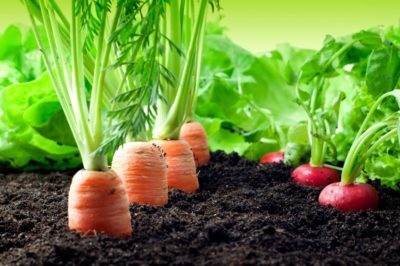 If you’re new to gardening, testing your soil might seem difficult. You could purchase a soil pH testing kit from a nursery or garden center, but they often come with a big price tag. And they aren’t always reliable.
If you’re new to gardening, testing your soil might seem difficult. You could purchase a soil pH testing kit from a nursery or garden center, but they often come with a big price tag. And they aren’t always reliable.
Another option is to have your local Cooperative Extension Office test your soil for pH levels and nutrients. The analysis is very helpful because it’s very detailed and includes suggestions specific to your region. However, the soil analysis could take a few weeks.
If you don’t have time—or money—consider making your own soil pH testing kit from scratch. The Guru Magazine recommends using a simple method for checking your soil.
Here’s What You’ll Need To Test Your Garden Soil
- Two Glass Jars
- Measuring Cup
- Vinegar
- Water
- Baking Soda
Directions
Step 1: Get A Soil Sample
Scoop out ¼ cup of soil from your garden and put it into a glass jar.
Step 2: Add Vinegar
Add ½ cup of vinegar to the soil in your glass jar. The vinegar may or may not fizz. If the mixture fizzes, your garden soil pH is alkaline. But if the mixture doesn’t fizz, go to Step 3.
The Secrets Of Sea Minerals To Grow More “Nutritionally-Dense Food” Than You Can Possibly Eat!
Step 3: Get Another Sample
Take ¼ cup of soil from your garden and put it into another jar.
Step 4: Add Water
Add ½ cup of water to your soil sample and mix.
Step 5: Add Baking Soda
Add ½ cup of baking soda to the soil mixture. If the mixture fizzes, the soil is acidic. If your soil didn’t react to the vinegar or baking soda, the soil is already pH balanced. Congratulations! You are now ready to plant!
Depending on what you are planting, you may need to change your soil to make it more pH balanced. If your soil is acidic, try adding lime. And to alkaline soil, add sulfur. But the results can vary and may not even be permanent. Before you begin planting, always make sure that your plants are able to thrive in your soil.
Plants That Love Alkaline Soil
- Asparagus
- Beets
- Cabbage
- Cauliflower
- Celery
- Cherries
Plants That Love Acidic Soil
- Blackberries
- Blueberries
- Citrus
- Cranberries
- Currants
- Elderberries
- Gooseberries
- Parsley
- Peppers
- Potatoes
- Radishes
- Raspberries
- Rhubarb
- Strawberries
- Sweet Potatoes
Story continues below video, which tells how the layout of rows impacts growth
Plants That Love PH Balanced Soil, But Tolerate Slightly Acidic Soil
- Apples
- Beans
- Broccoli
- Carrots
- Corn
- Cucumbers
- Grapes
- Kale
- Lettuce
- Melon
- Onion
- Peas
- Peaches
- Spinach
- Squash
- Tomatoes
Cheap Ways To Fertilize Your Garden Soil
(1) Scatter Grass Clippings
Using grass clippings will fertilize your garden as much as one or two fertilizer treatments each year. Don’t use any clippings if any herbicides have been used on your lawn, because it will make your soil toxic.
(2) Use Kitchen Scraps
Scraping off leftover food can make a good fertilizer for your garden. Even coffee grounds can be a good way to make your alkaline soil more pH balanced. If you don’t have enough compost for your lawn or garden, you can always look for compost from local farmers.
(3) Scatter Wood Ash
If you burn wood, the ashes can be used to fertilize your garden. The potassium in the ashes will be helpful for making acidic soil more pH balanced. Make sure that you use a thin layer of ash. And do not use ash from painted or treated wood, because it will make the soil toxic.
(4) Add Crumbled Eggshells
Eggshells contain calcium, which is helpful for many plants, especially tomatoes. Put crumbled eggshells at the bottom of your planting hole, or place them in the soil around the base of your tomato plant.
Whether you are making your own fertilizer or a do-it-yourself soil testing kit, planting a garden doesn’t have to be complicated. These methods are easy and they are a great way to save money. And let’s face it—it’s always nice to save money!
 Off The Grid News Better Ideas For Off The Grid Living
Off The Grid News Better Ideas For Off The Grid Living



